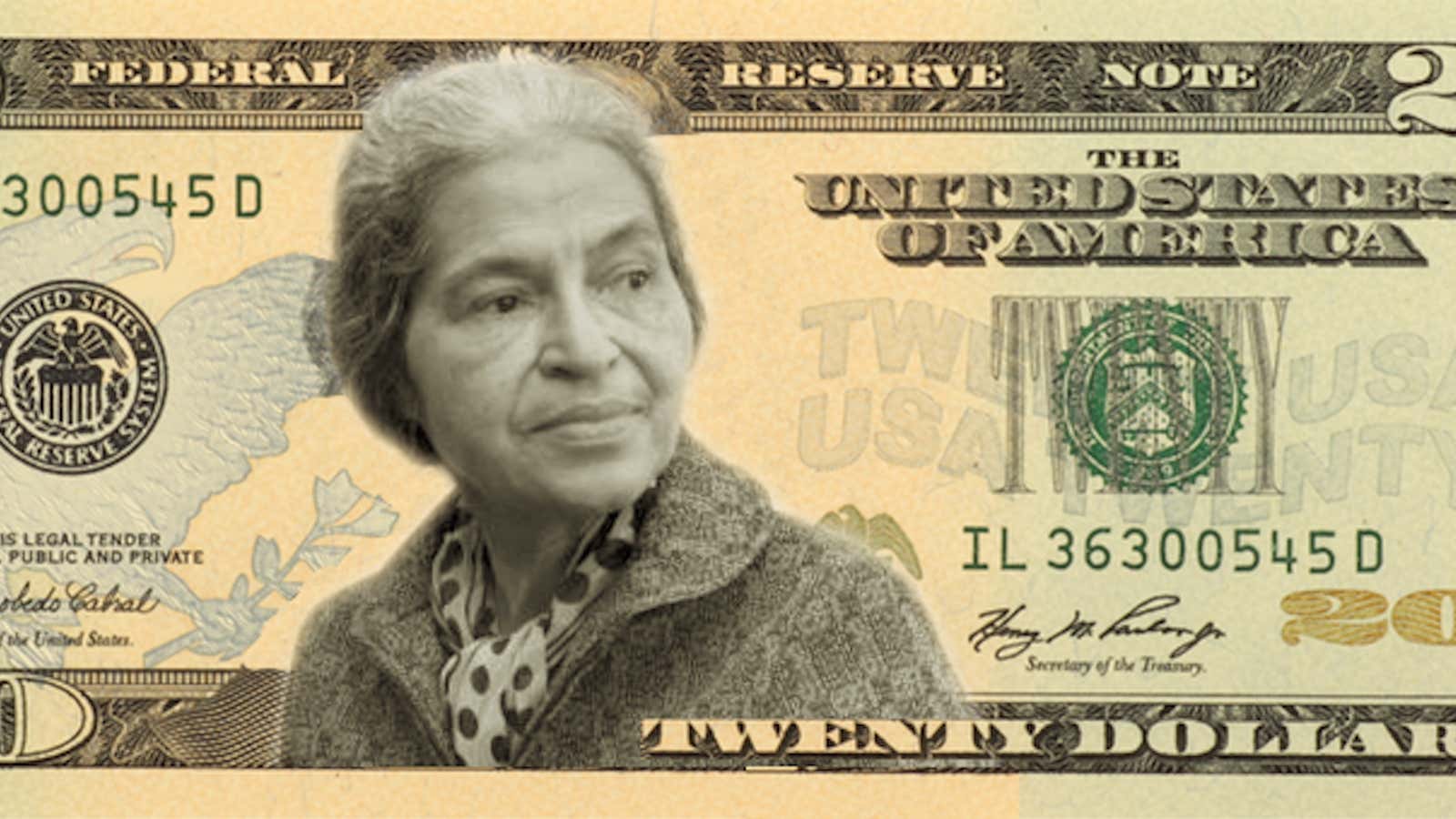George Washington, Thomas Jefferson, Abraham Lincoln, Alexander Hamilton, Andrew Jackson, Ulysses S. Grant, and Benjamin Franklin—if you have ever used paper currency in the US, then you have at some point handled bills graced with portraits of some or all of these American leaders.
While there’s nothing wrong with honoring this cadre of deceased white leaders—representing a who’s who of presidents, generals and state officials—their distinctly masculine visages are a constant reminder of the way American history quietly but consistently overlooks the contributions of 50% of its population. A particularly unnecessary form of patriarchal backwardness, the treasury’s boys’ club reinforces the idea that capitalism and governance is (white) men’s work.
But it doesn’t have to be this way.
That’s where Women On 20s comes in. Founded by Barbara Ortiz Howard and Susan Ades Stone just in time for Women’s History Month, Women On 20s is holding an online competition to choose a woman to eventually replace Andrew Jackson on the $20 bill.
“We think there’s no greater gender gap than on our money,” Stone told Quartz. “Of our print denominations, every single one bears portraits of men, something that hasn’t changed since 1929. I like to call that ‘Money 1.0.’ It’s time for a change.”
While originally the duo aimed to replace Hamilton’s portrait on the $10, they decided to settle on Jackson instead due both to his checkered legacy as well as the symbolism of the denomination. Neither the most popular (that would be the $100) nor arguably the most useful, the $20 has come under heavy scrutiny due to Jackson’s role in the generally forced removal of Native Americans from their ancestral lands in the first half of the 19th century. Jackson was also a vocal opponent of a central bank, meaning “he probably would be the first person to say get me off of here,” Stone said.
Then there’s the rather auspicious alignment of the upcoming centennial anniversary of women’s suffrage in 2020.
After a difficult, deliberate process in which Stone and Howard polled close to 200 leaders and historians, the final 15 candidates are a relatively diverse group, representing female intellectuals, politicians and activists from Sojourner Truth to Eleanor Roosevelt. Certainly not representative of the entire population (there are no Latina candidates, for instance), Stone and Howard have succeeded in shining a light on the many ways women have shaped who we are as a country.
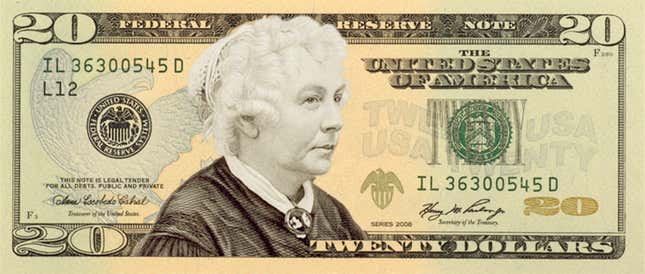
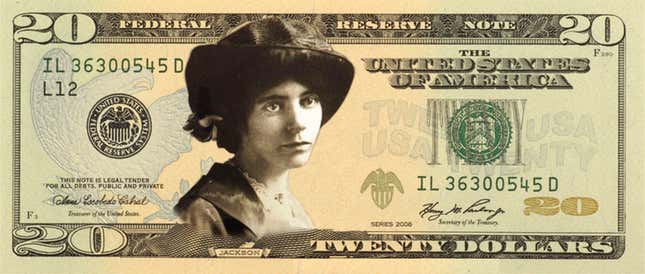
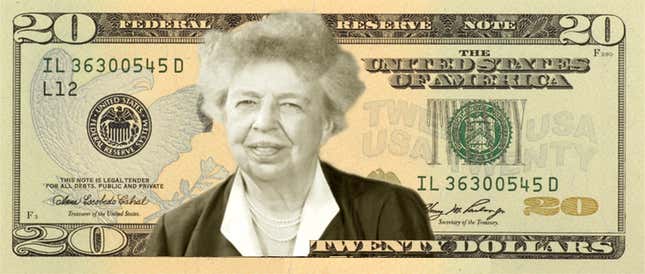
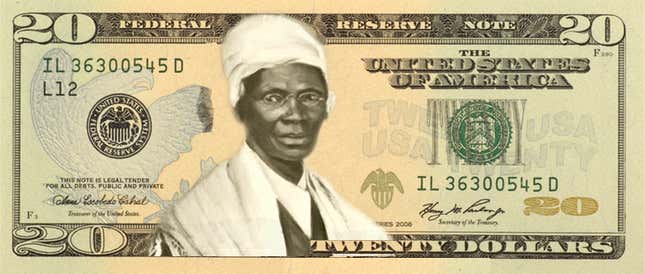
Throughout history, “women have driven transformational change and they deserved to be honored and valued in more than just a token way,” Stone noted. Of the current 15 frontrunners, online voting will winnow the field to the top three, after which a second and final round of voting will determine the top choice.
With close to 50,000 online visitors and counting, Stone said the campaign already a lot to celebrate
“We didn’t set out to become the end all, be all of women’s empowerment,” she noted. “There are a lot of groups already doing fantastic work. We can talk all we want about closing the gender gap and the pay gap, but this campaign allows people to do something proactive, it’s a simple act that can make some change and which might eventually lead to bigger change. And if we can educate just the 50,00 people who’ve come to our site so far, we’ve succeeded.”
While changing the national currency might seem like a fairly complicated endeavor, in fact due to an act of Congress back in 1862, secretary of the Treasury Jack Lew can make the change without Congressional approval. Additionally, every bill in circulation technically gets redesigned every seven to ten years in order to stay ahead of counterfeiters—and the $20 is due for a touch-up. Not bad timing. Plus, president Barack Obama has already expressed casual approval, remarking in July that putting women on US currency seemed like “a pretty good idea.”
Conservative politicians have been trying for years to put former president Ronald Reagan on currency, most recently floating the idea of having the 40th president’s face replace Civil War hero Ulysses S. Grant. “Every generation deserves its own heroes,” Stone notes. “That’s what this is about: we’re a very different country than we were in 1929 and our money should reflect that.”
A video produced by Women On 20s expands on this theme, featuring children realizing for the first time that their bills exclude girls. “I think it sends the message that we don’t value women as much as we value men, and that women haven’t accomplished as much as men have,” Stone explained. “Women already get short shrift in our history books, and they’re hardly ever seen in monuments or when kids are taken on field trips. We simply don’t memorialize women like we do with men.”
Perhaps this is why children and their teachers are some of the organization’s biggest supporters. Educators have written in to the campaign at all levels, Stone noted, sharing stories of students suddenly interested in the democratic process, putting up posters and launching signature drives.
But will it be enough to break this paper ceiling?
Stone and Howard certainly think so. “I wouldn’t have spent a year of my life on it if I didn’t think it could work,” Stone laughed. Elizabeth Cady Stanton would be proud.
